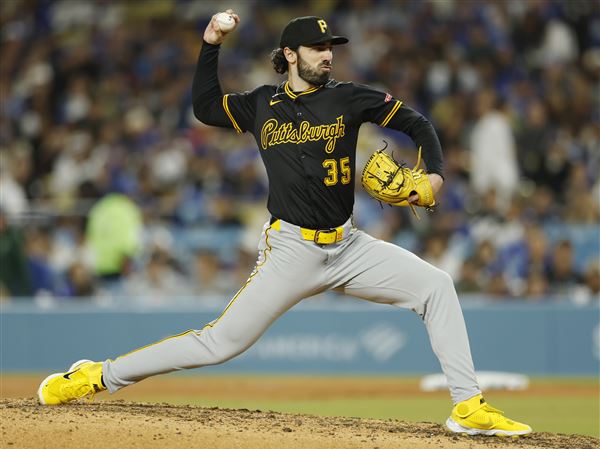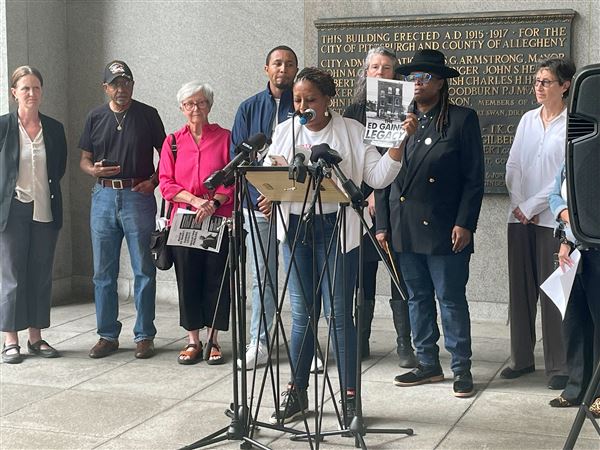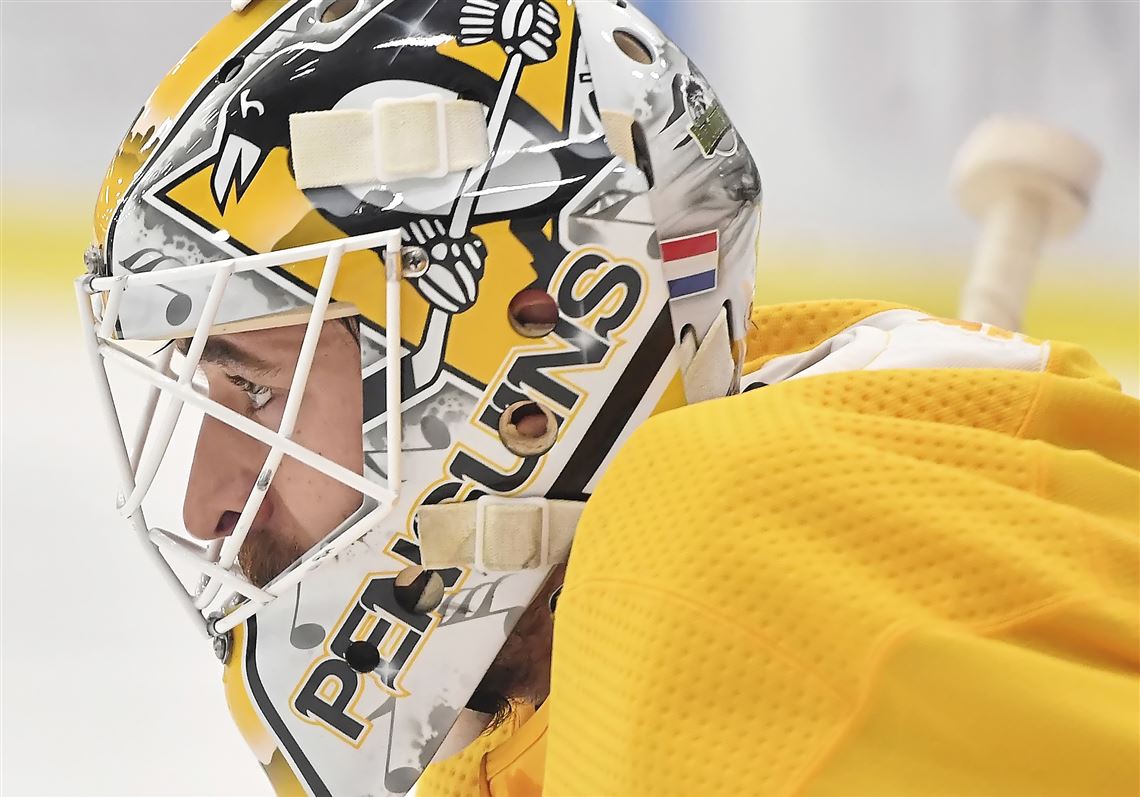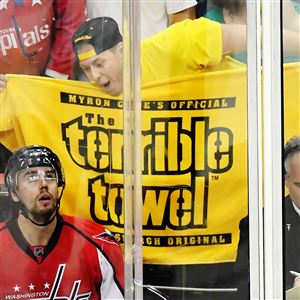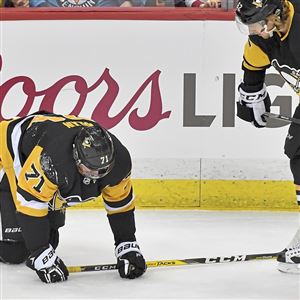Evgeni Malkin and Carl Hagelin were spotted walking around UPMC Lemieux Sports Complex Tuesday looking no worse for wear. The problem was that neither took the ice for practice.
Malkin (lower-body injury) and Hagelin (upper-body injury) officially are considered day-to-day ahead of the Penguins’ Eastern Conference semifinal against the Washington Capitals, the exact start date still somehow unknown.
Will they play? How will the Penguins get by without one or both, assuming that’s necessary?
Together, that’s the most pressing question this series presents. Only three players had more than Malkin’s 98 points, while Hagelin produced eight goals and 25 points over the final 37 games of the regular season. Both play key roles on specials teams, too, which should be pivotal in this series.
“Losing a guy that scored almost 100 points and 40 goals, I think you can’t really replace that, the way he plays and everything,” Derick Brassard said of the possibility of losing Malkin. “As a group, we’re all going to have to step up and play some big minutes. You can’t lose a guy like that, you can’t replace it. But as a group, I think we’re going to have to step up the way we did in Philly.”
Two things with that: One, Brassard seems almost relegated to not having Malkin for Game 1. Two, if that turns out to be the case, expect Brassard to stick between Conor Sheary and Bryan Rust.
Coach Mike Sullivan likely will keep Riley Sheahan with Phil Kessel while deploying either Zach Aston-Reese or Dominik Simon at the left-wing spot previously occupied by Hagelin.
Sheahan played perhaps his best game with the Penguins in Game 6 against the Flyers while pinch-hitting for Malkin, and he did so by sticking to his game — not trying to be Malkin.
“I just try to go in there and create some space for Phil and get him the puck,” Sheahan said. “[Malkin] is one of the best players in the league for a reason. Just have to try and stay focused, play my game and contribute however I can.”
Those aren’t the only questions the Penguins should concern themselves with in this series. Here are four more:
2. Is this finally the year?
The Penguins have won 9 of 10 all-time playoff meetings against the Capitals.
It’s also the second time the teams have met in three successive years. The previous time, 1994-96, the Penguins suffered their lone loss of this lopsided series (1994).
Also remember a few years back (2014-16) when the Penguins played the New York Rangers three times in a row, finally getting over the hump in the final meeting.
The Capitals, who definitely have a new look to them this season, likely will view this as their chance to finally dethrone the two-time Stanley Cup champs. After practice Tuesday, the Penguins kept the each-year-is-different mentality.
“It’s in the past,” Kris Letang said. “It’s different years. They have different personnel. We have different personnel. It’s all new.”
3. What damage will Alex Ovechkin inflict?
We’re talking about the guy who had five goals in the Eastern Conference quarterfinals against Columbus, two in a series-clinching Game 6.
In the regular season, Ovechkin won his fifth goal-scoring title in the past six seasons with 49.
He’s undoubtedly the best goal-scorer of this generation, and the Penguins know they need to limit his time and space. Then again, a lot of teams have known they need to limit Ovechkin’s time and space. The trick is actually doing it.
“He’s a pretty big threat out there,” Letang said. “Every time you can do your job against him and do it right, it’s pretty exciting. He’s really tough. It’s a big task. He’s a big body. He’s physical. He’s got a big shot. We all know that. A lot of skill. It’s a big challenge. It’s fun to be a part of.
“You have to reduce his time. You don’t want him having all kinds of time to release that puck. Try to play him tight.”
That shouldn’t be an issue for Letang. If the Capitals can get Ovechkin out against the Penguins third defense pair, that could wind up making a huge difference.
4. Who wins the special-teams battle?
Doing so predicted the winner six times out of six chances in the Penguins series against the Flyers.
Futhermore, take a peek at the regular-season series between these teams, and it shows a huge reliance on special teams.
The Penguins went 6 for 10 on the power play in games they won, 7 for 7 on the penalty kill. In their losses, the Penguins power play went without a goal on nine power plays and allowed two power-play goals in 11 chances.
“That’s a huge part of the playoffs,” goalie Matt Murray said. “That’s a huge part of success in general — special teams. It’ll probably be a big part of the series going forward. We just have to look to get better and better as we go and try to win that special-teams battle.”
5. It’s hard to handicap this series without talking extensively about goaltending — and two good friends in Braden Holtby and Murray.
Who will be better? It’s a simple question, but definitely one worth pondering.
Murray just finished a series that saw him post a 2.20 goals-against average and .911 save percentage, numbers that would’ve been a lot higher had it not been for a so-so Game 6.
Holtby, meanwhile, reclaimed his starting job midway through the Capitals series against the Columbus Blue Jackets and was lights out, posting a 1.92 goals-against average and .932 save percentage.
Holtby is two years removed from winning the Vezina Trophy, but Holtby has a 2.90 career goals-against average against the Penguins, which is well above his career mark (2.41). Murray might be the best clutch netminder in the NHL.
“He’s a guy I look up to a lot,” Murray said of Holtby. “There’s a lot of those guys around the league, where I feel honored to play across from them. At the end of the day, I’m worrying about my game.”
Love our Penguins coverage? Consider subscribing.
Support journalism. Subscribe today.
Jason Mackey: jmackey@post-gazette.com and Twitter @JMackeyPG.
First Published: April 24, 2018, 6:25 p.m.

